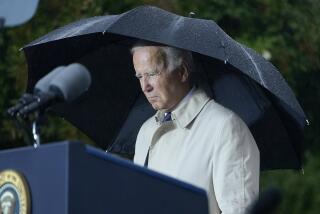Bush Talk to Troops Recalls Fall of Baghdad
- Share via
FT. HOOD, Texas — Addressing troops two years to the week after U.S. forces seized the Iraqi capital of Baghdad, President Bush said Tuesday that the ouster of Saddam Hussein ranked in historical importance alongside with the defeat of communism in Europe.
“For millions of Iraqis and Americans, it is a day they will never forget,” Bush told 25,000 Army soldiers at Ft. Hood, home to thousands of troops recently returned from fighting in Iraq and thousands more preparing for second or third tours. “The toppling of Saddam Hussein’s statue in Baghdad will be recorded, alongside the fall of the Berlin Wall, as one of the great moments in the history of liberty.”
Bush was referring to the April 9, 2003, scene broadcast live on television across the world in which U.S. troops helped joyous Iraqis bring down a 40-foot statue of the defeated dictator, signaling to skeptical Iraqis that Hussein had been beaten.
At the time, U.S. officials expected eventually to discover stashes of biological and chemical weapons and evidence of a nuclear weapons program that had been the chief rationale for the war. Such weapons were never found.
Bush’s remarks on Tuesday showed how he hoped history would view his decision to go to war and reflected Iraq’s position as the centerpiece of his agenda to reshape the Middle East.
The president spoke Tuesday as some military officials had begun to talk openly about reducing the U.S. presence in Iraq and as Iraq’s newly elected parliament had named a president and a prime minister.
Bush did not indicate any immediate plans for substantial troop reductions, but he did point to a “new phase” of operations. “Iraq security forces are becoming more self-reliant and taking on greater responsibilities,” he said. “And that means that America and its coalition partners are increasingly playing more of a supporting role.”
He added: “Like free people everywhere, Iraqis want to be defended and led by their own countrymen. We will help them achieve this objective so Iraqis can secure their own nation. And then our troops will come home with the honor they have earned.”
Although Bush’s figure for trained Iraqi forces was in line with the Pentagon tally of 152,617, the Government Accountability Office had cast doubt on the administration figures. In March, the watchdog agency said the Pentagon, when tallying the number of trained and equipped Iraqi troops, had included “tens of thousands” of police officers who were absent without leave.
The president hailed Iraq’s new government and the signs of democracy, pointing to independent newspapers, a new currency, a new school curriculum and a court system that he said would give Hussein “the trial that he did not afford his fellow citizens when he was in power.”
Bush described the January elections there and the recent formation of a government as part of a “critical mass” of events pushing the region toward democracy.
“As the Iraq democracy succeeds, that success is sending a message from Beirut to Tehran that freedom can be the future of every nation,” he said. “The establishment of a free Iraq at the heart of the Middle East will be a crushing defeat to the forces of tyranny and terror, and a watershed event in the global democratic revolution.”
But even as he accentuated the positives and thanked the flag-waving troops for their efforts, Bush confronted the rising death toll that had made some soldiers wary of a return trip to Iraq.
More than 1,500 U.S. soldiers have died in the effort since combat operations began in March 2003. About 150 of them were based at Ft. Hood.
After he ate lunch with soldiers, the president met privately with 33 families of troops who were killed in Iraq.
“We honor their memory,” Bush said. “We lift them up in prayer. Their sacrifice will always be remembered by a grateful nation.”
More to Read
Get the L.A. Times Politics newsletter
Deeply reported insights into legislation, politics and policy from Sacramento, Washington and beyond. In your inbox twice per week.
You may occasionally receive promotional content from the Los Angeles Times.










